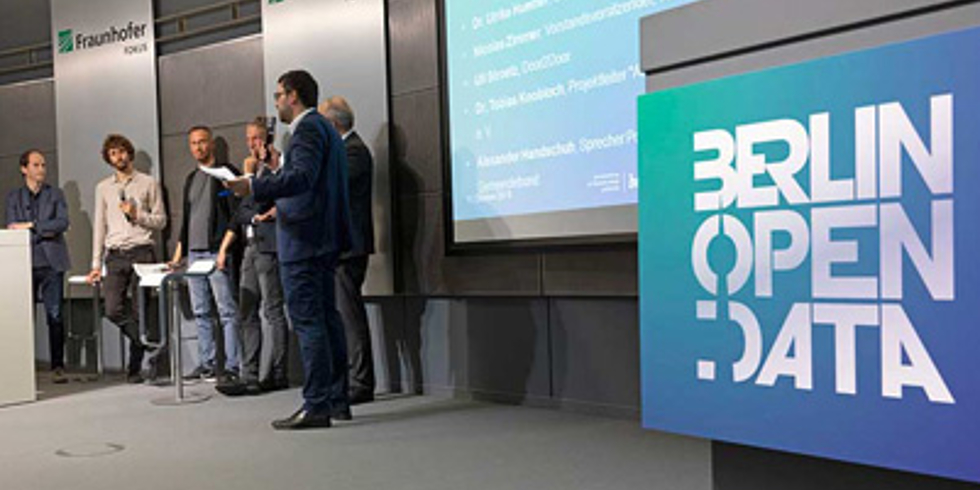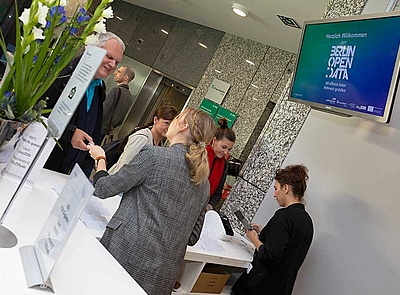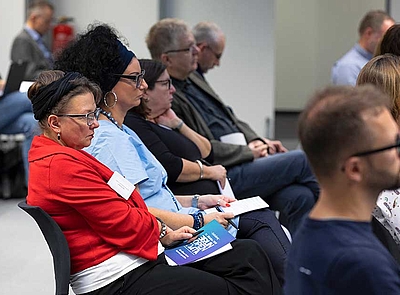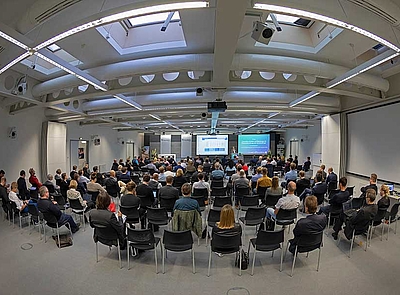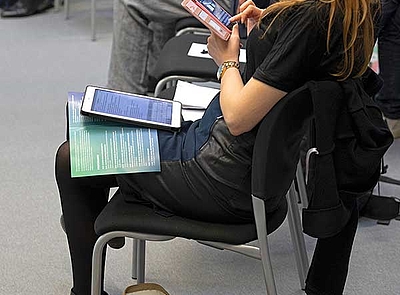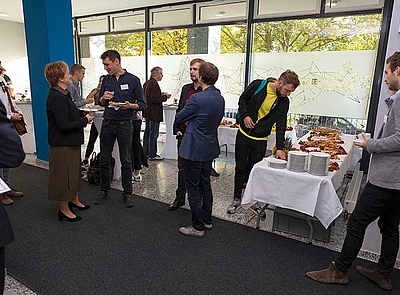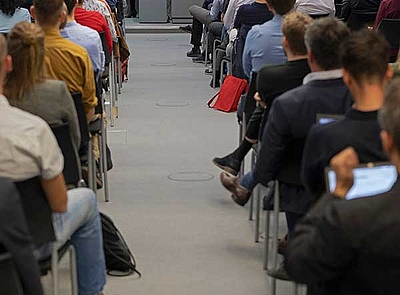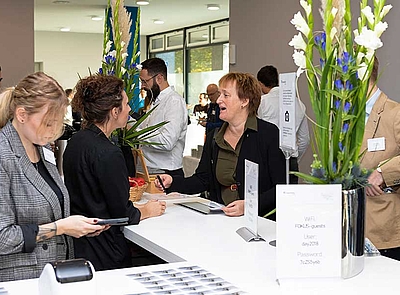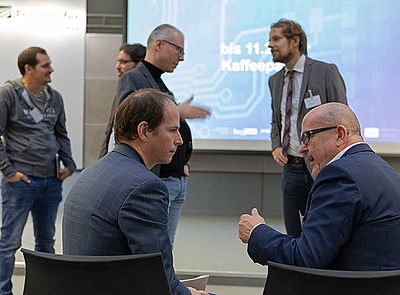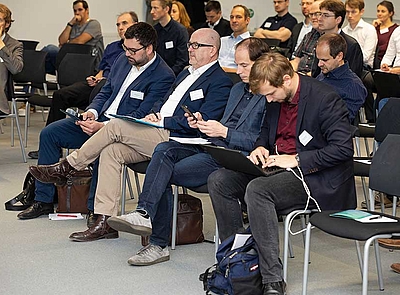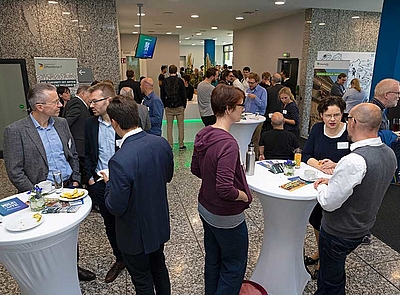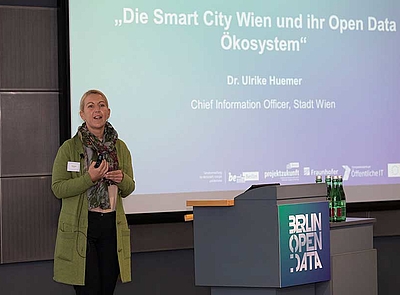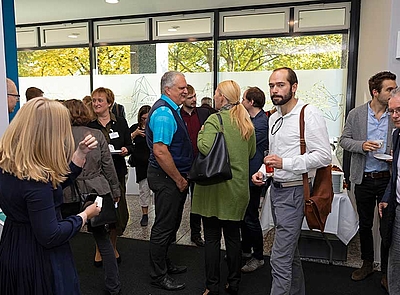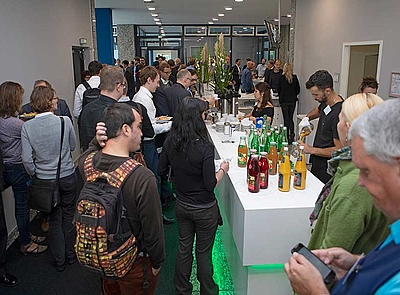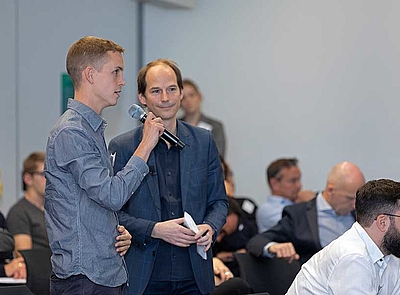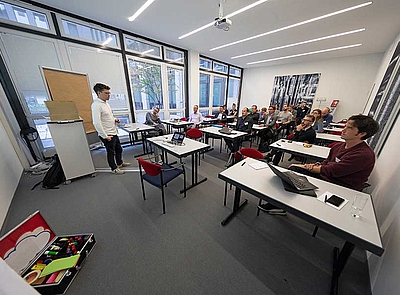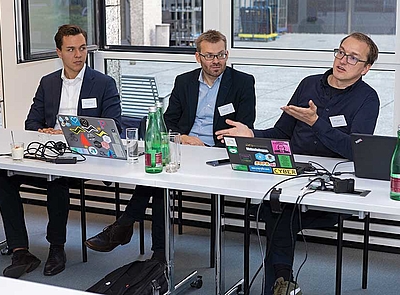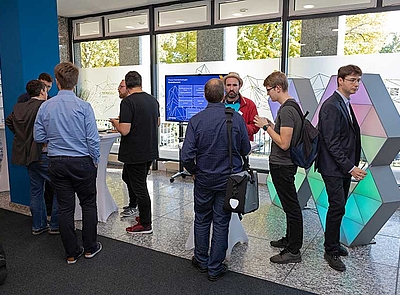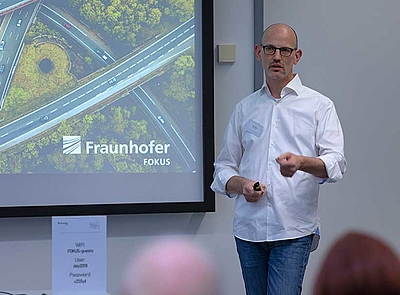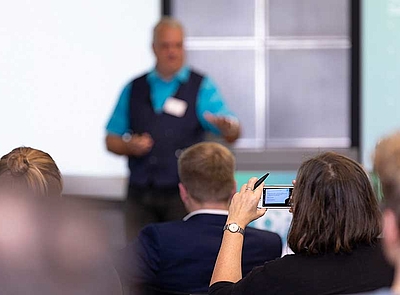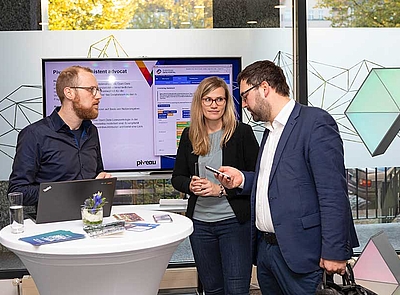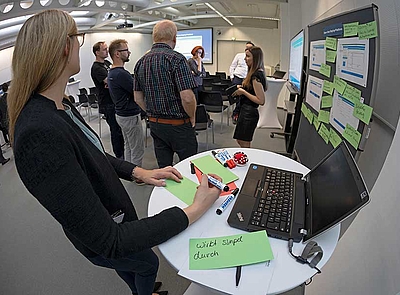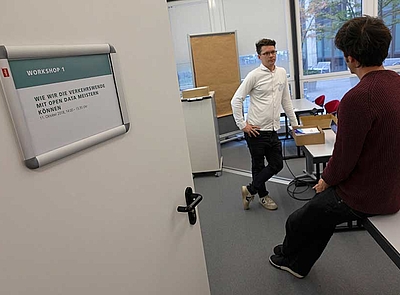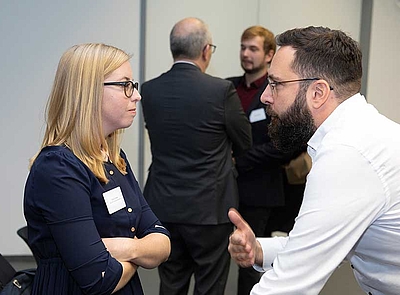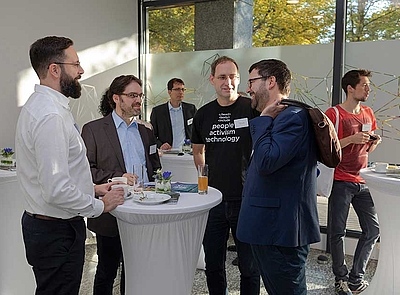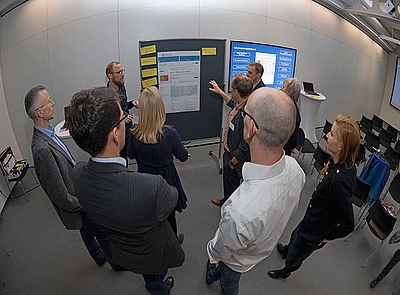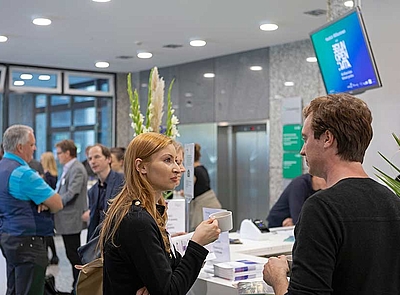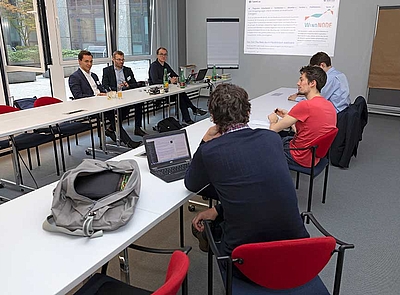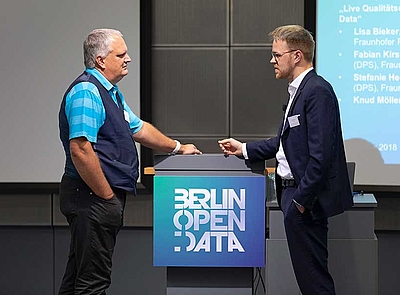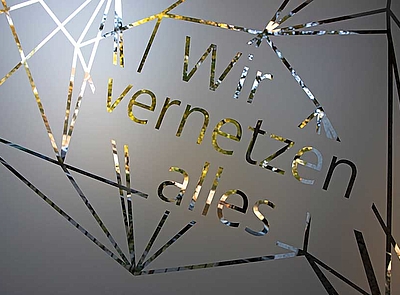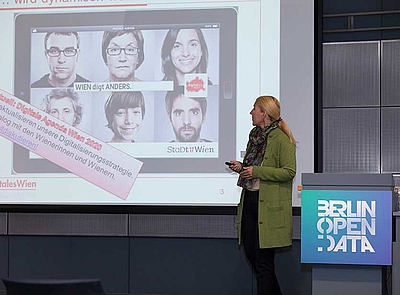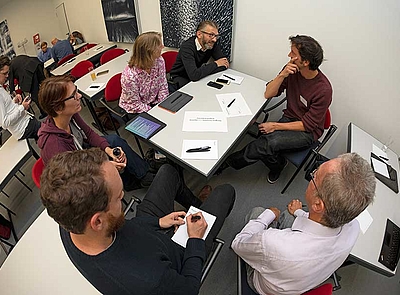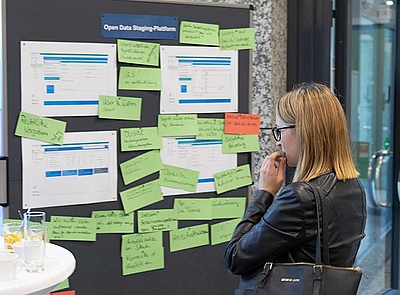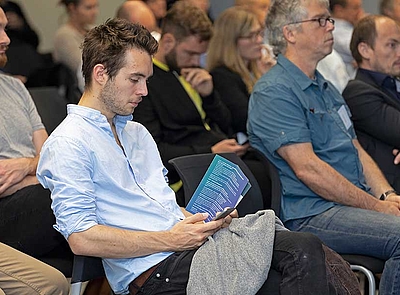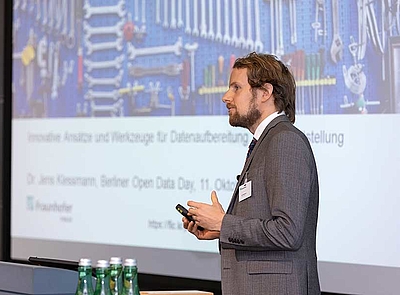Berlin Open Data Day 2018
Berlin Open Data Day 2018
The theme of Berlin Open Data Day 2018 was ‘Creating added value with Open Data’. More than 150 participants from the Berlin Administration and Open Data Community came together to share experiences and build networks.
Initiated by the Senate Department for Economics, Energy and Public Enterprises, this year’s Berlin Open Data Day (BODDy) was held in cooperation with <link https://www.fokus.fraunhofer.de/>Fraunhofer FOKUS</link> and the Competence Center Public <link https://www.oeffentliche-it.de/>IT</link> on 11th October 2018.
Together with Sebastian Askar, head of the department for digitalisation, ICT economy and digital infrastructure at the Senate Department for Economics, Energy and Public Enterprises, Dr. Ina Schieferdecker, director of the Fraunhofer institute FOKUS, opened the BODDy with a brief review of their joint work in establishing the Open Data portal.
Prof. Dr. Ina Schieferdecker emphasised that, “In addition to transparency and participation, the added value of Open Data is to strengthen the economy through new or enhanced business opportunities. Opening the city for the use of Open Data is a crucial aspect for topics related to Smart City, developing business solutions, eGovernment services and other technological innovations in order to drive digital transformation in the city.”
State Secretary Christian Rickerts then presented the Open Data strategy developed by the State of Berlin. Over the past year, the administration has made substantial progress, covering in particular three fields:
- further development of the legal framework for the provision and use of Open Data
- improving the technical infrastructure for Open Data and
- supporting the people who have made Open Data possible in the first place.
“Our aim is to further expand the data provided by the Berlin Administration. To achieve this, Open Data require disseminators. By organising the Berlin Open Data Day, we support the experts working in the Administration and encourage exchanges with the Open Data Community”, said Christian Rickerts.
After taking a look at the national level, Erwin Schwärzer, DGI head of section (Digital Society at the Federal Ministry of the Interior, Building and Community) followed with a keynote speech on the use of Open Data in the federal administration.
The Open Data Act was adopted at the federal level on 13th July 2017, with a central office for the coordination and support of Open Data at the federal level being established on 1st September 2018. In his speech, Erwin Schwärzer stressed the importance of Open Data saying, “The increased data availability can play an important role in the implementation of future topics such as artificial intelligence in a responsible manner.”
Dr. Jens Klessmann of Fraunhofer FOKUS showed a live demo of an Open Data staging tool for data processing and provision, analysing the tool’s functionality and quality.
The Open Data Information Point (<link http://odis-berlin.de/>ODIS</link>) presented some of their Open Data application examples. ODIS is supported by the Senate Department for Economics, Energy and Public Enterprises via subsidies over a period of two years with the aim of supporting the Berlin Administration in opening and providing data. Victoria Dykes of ODIS spoke about the app and website on swimming areas in Berlin and hygienic assessment of the bathing water quality. These current measurements are Open Data, provided for example by the Regional Office for Health and Social Affairs (<link https://www.berlin.de/lageso/>LaGeSo)</link> on the one hand and safety-related data provided by the water utility company <link http://http//www.bwb.de/content/language1/html/index.php>Berliner Wasserbetriebe</link> on the other.
A further practical example is the visualization of data taken from the subsidy database provided by the Senate Department of Finance. ODIS will shortly launch an app that provides an overview of all subsidies, stating the annual amount and geographical distribution in the individual districts.
The highlight of the event was the presentation of the Best Practice Case Study given by Dr. Ulrike Huemer, CIO of the City of Vienna. She presented Vienna as a smart city with its digitalisation strategy “Wien digt anders vor”. With regard to digitalisation, Vienna is far ahead of other cities, and it has developed smart administration apps for its citizens. One app deals for example with the concern management the city’s inhabitants can use not only to report broken streetlights and garbage dumps in the city, but also track their complaint’s handling status.
Dr. Ulrike Huemer presented the “Vieanna Bot” – another example for digitalisation in the city of Vienna. This chatbot is able to answer the citizens’ questions to the administration.“Vieanna Bot” also uses Open Data and the aim is to develop it further by means of artificial intelligence.
One of the topics fiercely disputed at the panel discussion was the question ‘Open Data: A lucrative source of income or priceless common property?’ The focus of the debate was whether administrative data should be made freely available to everyone or rather sold as a business model.
For panellist Nicolas Zimmer, Chairman of <link https://www.technologiestiftung-berlin.de/de/startseite/>Technologiestiftung Berlin</link>, Open Data have become an integral part of our everyday work and administrations are required to provide their data to the general public as Open Data at no cost.
Freely available data are equally important for Ulli Stroetz, startup founder for<link https://www.door2door.io/de/index.html> Door2Door</link>. This startup uses a variety of Open Data from the administration, edits them and makes them available to the general public, providing additional options for use.
Alexander Handschuh, representative for fundamental political issues at the <link https://www.dstgb.de/dstgb/Homepage/>German Association of Towns and Municipalities</link>, took up a different position. In accordance with the principle of subsidiarity, each municipality ought to decide for itself on whether and what data they want to publish.
Dr. Tobias Knobloch, project manager for the “Algorithmen fürs Gemeinwohl” project initiated by <link https://www.stiftung-nv.de/>Stiftung Neue Verantwortung e. V.</link>, supported a multi-stage model with free data on the one hand and data that the user pays for to benefit from high-quality and up-to-date provision on the other.
Dr. Ulrike Huemer, CIO of the City of Vienna, believes that all data that can be published should be made available to the general public as Open Data at no cost. She said further that it would be too complicated and expensive for the administration to prepare data in a way to sell them as part of a business model, which would require a payment system and billing procedures.
The programme continued after lunch with four parallel workshops the participants could choose from.
Another workshop led by Fraunhofer FOKUS institute discussed the frontend and backend aspects of Open Data portals.In his workshop, Dr. Benjamin Seibel of Technologiestiftung Berlin launched the new <link https://fixmyberlin.de/>FixMyBerlin</link> app containing data on bike traffic. He explained how an ecological traffic turn can be achieved using Open Data.
Walter Palmetshofer of <link https://okfn.de/>Open Knowledge Foundation</link> and Christian Jacob of <link https://www.stromnetz.berlin/de/index.htm>Stromnetz Berlin</link> presented energy data made available to the hackers on the occasion of <link news/news-detail/energyhack2-day-2018/>EnergyHack</link>.
The workshop led by <link https://www.accenture.com/de-de/new-applied-now>Accenture</link>, the City of Vienna and Berlin Partner discussed topics such as artificial intelligence, blockchain and their connection to Open Data.
Following the workshops, the participants had the opportunity to get together with coffee and cake and exchange opinions and draw final conclusions about a day entirely marked by Open Data.
Contact
Sebastian Askar
Leitung Digitalisierung, IKT-Wirtschaft und digitale Infrastruktur
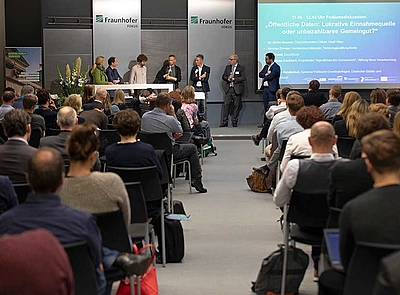
Podiumsdiskussion zum Thema "Öffentliche Daten: Lukrative Einnahmequelle oder unbezahlbares Gemeingut?"
© Dirk Heckmann/ SenWEB
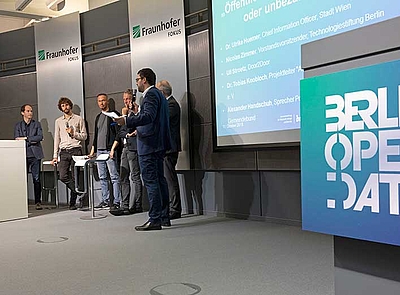
Podiumsdiskussion zum Thema "Öffentliche Daten: Lukrative Einnahmequelle oder unbezahlbares Gemeingut?"
© Dirk Heckmann/ SenWEB
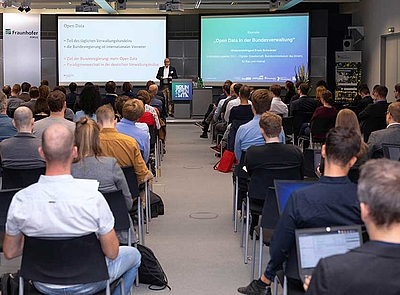
Ministerialdirigent Erwin Schwärzer spricht über Open Data in der Bundesverwaltung
© Dirk Heckmann/ SenWEB
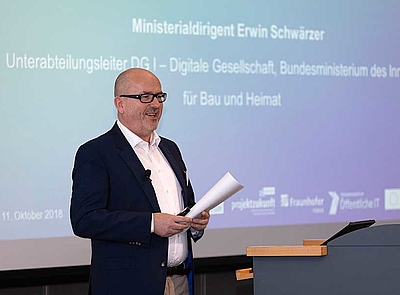
Ministerialdirigent Erwin Schwärzer spricht über Open Data in der Bundesverwaltung
© Dirk Heckmann/ SenWEB
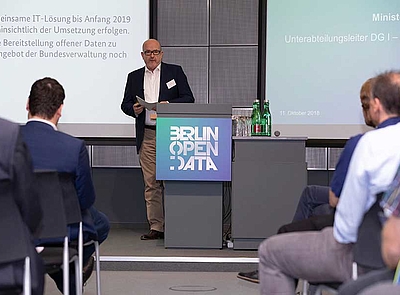
Ministerialdirigent Erwin Schwärzer spricht über Open Data in der Bundesverwaltung
© Dirk Heckmann/ SenWEB
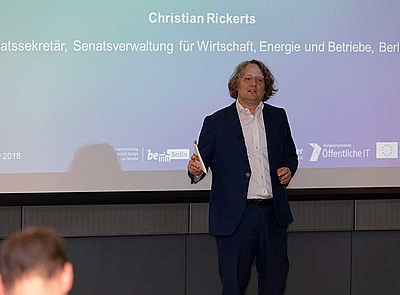
Staatssekretär Christian Rickerts klärt über die Open Data-Strategie des Landes Berlin auf
© Dirk Heckmann/ SenWEB
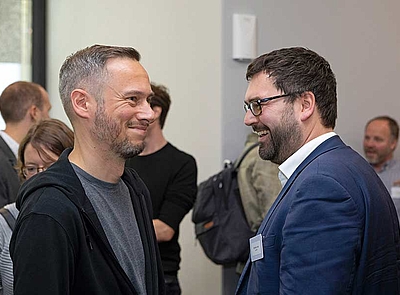
Sebastian Askar und Nicolas Zimmer von der Technologiestiftung Berlin unterhalten sich in der Pause
© Dirk Heckmann/ SenWEB
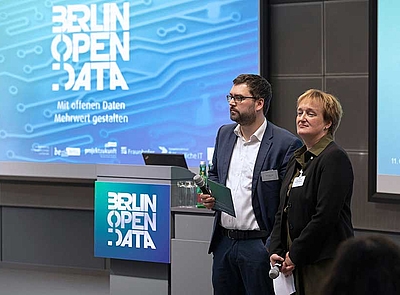
Sebastian Askar und Prof. Dr. In Schieferdecker begrüßen zum Open Data Day 2018
© Dirk Heckmann/ SenWEB
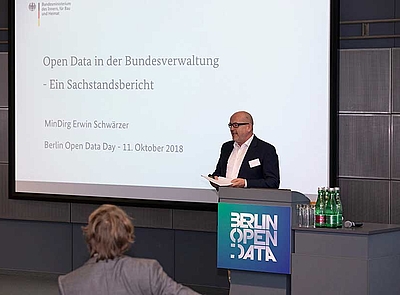
Ministerialdirigent Erwin Schwärzer, erklärt, welchen Beitrag eine besser Verfügbarkeit von offenen Daten leisten kann
© Dirk Heckmann/ SenWEB
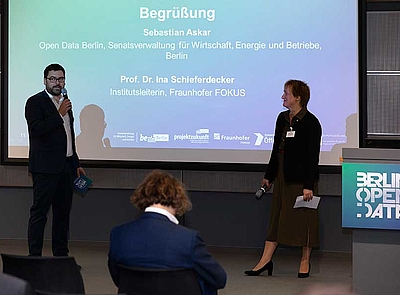
Sebastian Askar und Prof. Dr. In Schieferdecker begrüßen zum Open Data Day 2018
© Dirk Heckmann/ SenWEB
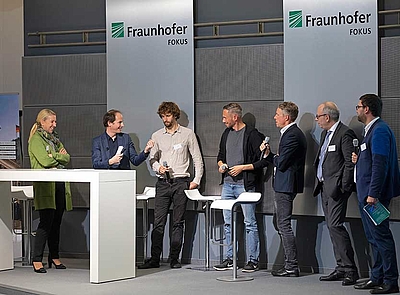
Podiumsdiskussion zum Thema "Öffentliche Daten: Lukrative Einnahmequelle oder unbezahlbares Gemeingut?"
© Dirk Heckmann/ SenWEB
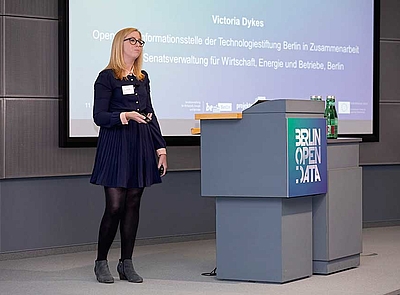
Victoria Dykes von der ODIS zeigt Anwendungsbeispiele von Open Data aus der Verwaltung auf
© Dirk Heckmann/ SenWEB
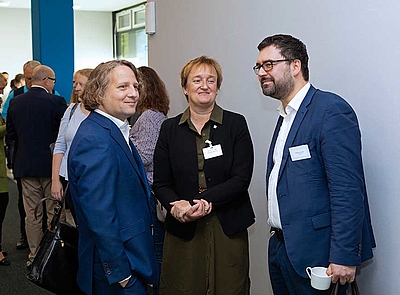
Staatssekretär Christian Rickerts, Prof. Dr. Ina Schieferdecker und Sebastian Askar (v. l.) in der Pause
© Dirk Heckmann/ SenWEB
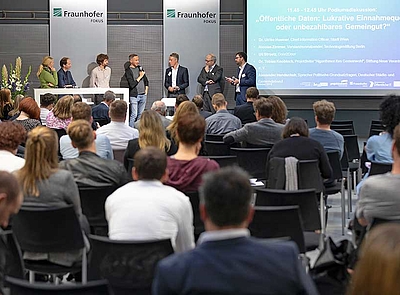
Podiumsdiskussion zum Thema "Öffentliche Daten: Lukrative Einnahmequelle oder unbezahlbares Gemeingut?"
© Dirk Heckmann/ SenWEB
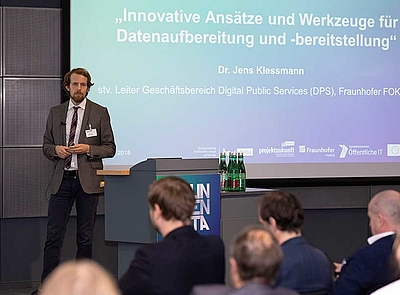
Dr. Jens Klessmann zum Thema "Innovative Ansätze und Werkzeuge für Datenaufbereitung und -bereitstellung"
© Dirk Heckmann/ SenWEB
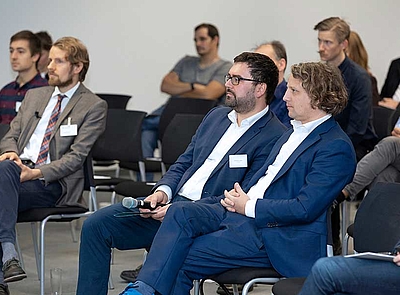
Sebastian Askar (Open Data Berlin) und Staatssekretär Christian Rickerst (v. l.)
© Dirk Heckmann/ SenWEB

